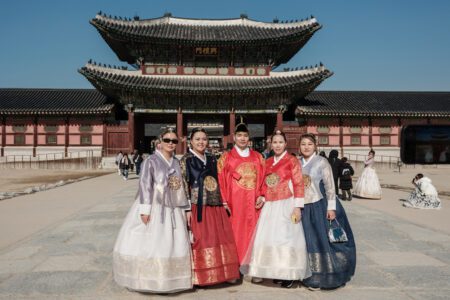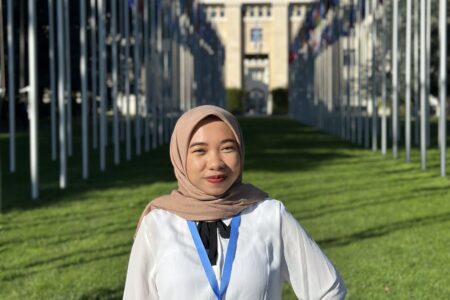
What do you want to achieve with a computer science degree?
Some might aspire to become the next Steve Jobs, a pioneer of the many tech we use today and in the future. Others seek to weave creativity into technology, like Quinxie Doan, who aims to create user-centred products for web design.
For Max Wiersma, his computer science degree is being put to ease the language learning process — something he hadn’t thought he’d be working on back when he was still pursuing his first bachelor’s degree.
Hailing from the Netherlands, Wiersma graduated in 2015 from the University of Groningen with a Bachelor of Science in Econometrics and Operations Research – but it wasn’t quite his calling.
“I didn’t really enjoy university in the Netherlands,” says Wiersma. “But we did have one or two classes in programming, and I enjoyed those classes more than the maths or statistics ones.”
Still, it wouldn’t be until Wiersma fulfilled his lifelong dream of living in South Korea long term that he did anything to pursue his budding interest in computer science.

Wiersma had visited South Korea twice and fell in love with it before he moved there on a working holiday visa. Source: Max Wiersma
Turning a dream into reality
Before moving to South Korea in 2015, the dream had circled Wiersma’s mind for four years.
He’d visited twice already and found himself taken by the little charms of the country, like the food, safety, and how politeness is built into the Korean language. He wanted to experience the big city life in a densely populated yet organised country, where many shops open 24/7, unlike in the Netherlands.
Better yet, South Korea was home to one of the most advanced tech industries. From Samsung, Hyundai Motor, LG Electronics, and Kakao Corp, there was no better place to pursue his studies in computer science in the country that ranked sixth in the Global Innovation Index 2024, and is using artificial intelligence to sustain eco-tourism.
In a serious bid to turn his dreams into reality, Wiersma spent a year and a half learning Korean.
“Every day, I would do text chats with Koreans,” he says, after learning the alphabet and over 200 words to form basic sentences. “I tried not to pressure myself to reply quickly, even if I had to go into a dictionary and look up a word or two.”
By the end of 2015, when he travelled some 8,745 kilometres from the Netherlands to South Korea on a working holiday visa, he wasn’t worried about communicating one bit.
But now came the real challenge: could he find the same success while learning in Korean?

After not particularly enjoying his bachelor’s experience in the Netherlands, Wiersma decided to give it another go in a South Korean university. Source: Max Wiersma
Round two of a bachelor’s degree
Many students wouldn’t throw themselves back into the grinder for another showdown, but that’s exactly what Wiersma did. A year after moving to South Korea, he applied to Kyungpook University in Daegu — a unique choice, considering most foreign students shoot for Seoul and its many English-taught offerings.
On top of that, it would’ve made sense for Wiersma to pursue either a certificate, a diploma, or a master’s programme. But he was planning for the long game.
“I felt like if I was going to live here for a decade, or multiple decades, then it’s worth going through the bachelor’s experience,” he says. “You get more talking points and also build up a network. There were a lot of benefits.”
Yet, despite his fluency in Korean, the language barrier still posed a challenge.
“Especially the first year, I found it a bit difficult to understand the professors when they were giving lectures, especially because of their speed of speech and the computer science-related terminology that I was not familiar with in Korean,” says Wiersma. It didn’t help that he had to adapt to the regional accent in Daegu too.
Despite that, he wouldn’t trade university life for anything.
At university in the Netherlands, Wiersma found that to get involved in activities on campus, you had to pierce through inner circles or depend on your personal connections. At Kyungpook, that wasn’t the case. He got to experience the culture, join in activities, and even volunteer at the university’s festival.
“It’s really communal,” he says. “People wouldn’t care that I was an international student. They were always welcoming and happy to have me join, whether that was things organised by the major, or things organised by university campus clubs.”

Wiersma preparing job applications at a cafe in Daegu, South Korea. Source: Max Wiersma
The roadblocks that come with pursuing computer science jobs
Wiersma graduated with his second bachelor’s degree in 2021.
Amidst a skin-prickling winter, he was neck deep in the search for a job that would secure him a visa to stay in the country. A large Korean tech company would offer him a position in a letter of congratulations. After two months of practically no communication, that same company would take the offer back.
At the crossroads of deciding what to do, Wiersma knew returning to the Netherlands wasn’t an option. He considered moving to Japan, even going as far as to start learning Japanese.
“One of the difficulties of South Korea is that everyone is vying for the same job,” Wiersma says. “It’s very much about what you’re willing to settle for, especially for a first job.”
That’s just the competitive nature of the nation, and perhaps the industry as a whole – everyone’s trying to prove themselves as worthy; everyone’s aiming for big companies like Google or Microsoft. Research shows that only 8% of foreign students in South Korea land local jobs after graduation, whereas in Japan, 44.3% of them do.
It’s certainly no walk in the park – but before Wiersma could make a hasty decision to uproot to Japan, he thought about the four years he’d spent building on a dream, and decided to give it another shot.
He contacted a company he’d interned at in Daegu to ask if he could return. They said yes instantly.
“I think I was a bit less confident than I should’ve been,” Wiersma says. “I could’ve done better for a first job in terms of location and payment. But I was quite worried, and I just wanted that security.”

Wiersma rents a coworking space in South Korea where he works to develop his software products. Source: Max Wiersma
Breaking away from the herd
Looking back, Wiersma doesn’t think he would’ve landed his first job in Daegu had he not been fluent in the language.
“Even if I’d done a master’s in the Netherlands, I don’t think I’d have been able to get a job here — both due to language issues and availability in the sector,” he says. Wiersma observed how more of his peers at university who were fluent in Korean landed jobs after graduation, compared to those who weren’t.
It’s a factor many underestimate: merely having a basic proficiency in Korean isn’t enough to navigate a full-time job in the country, even for those advertised as “English-speaking.”
That’s why today, Wiersma is working to develop a Korean language learning app.
It took a while for Wiersma to get to the level of developing his own tech products. After returning to his former company in Daegu, he had to work his way from the ground up. It was a fulfilling experience, even if that first job wasn’t everything he’d ever pictured in one.
He told himself, “I can just gain experience, and then after one to two years, I can upgrade.”
And upgrade, he did.
After a year and a half working as a backend engineer in Daegu, Wiersma sought to immerse himself in the big city life in Seoul. In a pleasant twist of fate, an American software company with an office in Seoul would reach out to recruit him first.
Another year and a half would pass, and he would break away to build a start-up.
“You learn so much having to do everything yourself, compared to working at a company,” says Wiersma. “In terms of technical skill set — the speed of learning is very, very quick.”

Wiersma is now based in South Korea, where he runs a software development start-up, launching his own products. Source: Max Wiersma
Creating his own language learning tool
The first year of running a software development start-up was filled with trial and error. Today, through the patience of learning, Wiersma is starting to launch his own products – something he credits his bachelor’s degree in computer science for preparing him for.
“If you’re making something for the Korean market, then absolutely, it’s invaluable to have done the bachelor’s at Kyungpook University,” he says. “I can’t think of many other ways that teach you so well about what the local market is like; what people enjoy, what they don’t.”
A few months ago, Wiersma launched a language learning app called Langda for people studying English. They must write diary entries in English, and the app offers detailed explanations, feedback, and corrections. It’s as if users have the guidance of a personal tutor, one that’s more accurate than the likes of Duolingo.
More recently, he’d launched the same kind of tool, but for Korean instead. It’s called TOPIK Easy 6, and is available for Android and iPhones.
“I’ve always loved learning languages,” says Wiersma. “During my working holiday, I did some English teaching at an academy in Korea, and at university, I did a lot of private English tutoring for other students. So, I got to see up close what their difficulties are.“










